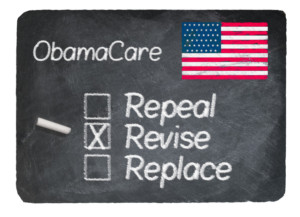The Justice Department tries to block the mergers that Obama’s health law intended.
Wall Street Journal- July 24, 2016 6:15 p.m. ET
Politicians tend to be most enraged by the problems they cause, and the liberal fury against insurance mergers is a classic of the genre. ObamaCare was designed to create government-directed oligopolies, but now its authors claim to be alarmed by less competition.
Last week federal and 11 state antitrust regulators filed a double lawsuit to block the pending $54 billion insurance tie-up between Anthem and Cigna and the $37 billion acquisition of Humana by Aetna. The mergers would reduce the national commercial insurers to three from five, and Attorney General Loretta Lynch says the government won’t cede such “tremendous power” over health care to a more concentrated industry.
Has she checked with the White House? The logic of ObamaCare is that larger and more integrated conglomerates are superior to a market with many insurers, doctors and hospitals vying for consumer business. The law promotes corporatism on the theory that larger systems are more efficient, but also because giants are easier to control politically and will standardize care as ordered.
The new regulations and mandates since the law passed in 2010 are designed to encourage consolidation, from accountable care organizations to new reimbursement methods and much else. The rise of huge health systems, salaried physicians and mega-insurers is precisely what Peter Orszag and Jonathan Gruber wanted.
But now the trust busters are fretting that these giants will have less incentive to innovate to reduce costs and improve quality, and patients will have fewer choices. Well, yes—as critics predicted.
“Competitive insurance markets are essential to providing Americans the affordable and high-quality health-care they deserve,” Ms. Lynch added in an especially amusing aside. The antitrust case against Aetna-Humana rests almost exclusively on Medicare Advantage, the program that lets seniors choose from a menu of private plans instead of using government fee-for-service. The combined company would serve about 8% of all seniors in 2016 if the merger went through this year.
Yet more than 69% of all Medicare beneficiaries are now channelled into traditional Medicare under ObamaCare’s rules and funding levels. By the AG’s antitrust argument, the government should sue the government to break up ObamaCare. By contrast, mergers often allow insurers to expand into new geographical markets that they couldn’t manage as a smaller concern.
Another reason to merge is the efficiencies that can be passed on to consumers in lower premiums. In a June 22 letter to Ms. Lynch, a cast of liberal all-stars including Senators Elizabeth Warren of Massachusetts and Richard Blumenthal of Connecticut warned that, “History shows that mergers can frequently cause job losses as the firms eliminate supposedly redundant positions and consolidate operations. Economists are also increasingly warning that excess monopoly power concentrates profits and power in fewer hands at the expense of wage and job growth.”
In other words, in the name of “competition,” the government should entrench wasteful and duplicative enterprises that benefit some of their constituents. As for monopoly power, under ObamaCare all insurers might be viewed as a quasimonopoly because it is nearly illegal for one to differentiate itself. Benefits are standardized into interchangeable commodities and insurers are public utilities because the law imposes price caps on operating margins and thus profits.
Anthem-Cigna and Aetna-Humana would make U.S. health care more competitive to the extent that they counterbalance the provider cartels that ObamaCare also created. Local medical monopolies now dominate regions from Boston to Cleveland to Pittsburgh to the Bay Area. There is substantial economic evidence that these systems can command marked-up reimbursements that maximize revenue but are unrelated to better care.
Thus the Federal Trade Commission, which oversees antitrust for providers, has been haplessly attempting to block the doctor and hospital merger wave. In May federal Judge John Jones rejected the FTC’s attempt to scotch the merger of Penn State Hershey Medical Center and Pinnaclehealth System in central Pennsylvania.
Judge Jones rebuked the commission for ignoring “the health-care world as it is” and remarked on the “no small irony that the same federal government under which the FTC operates has created a climate that virtually compels institutions to seek alliances such as the hospitals intend here.” The FTC lost again this month, as an Illinois federal court refused to block the merger of two Chicagoland systems.
In essence Justice and the FTC are punishing companies for obeying commands by other parts of the Obama Administration. But the real worry for trust busters shouldn’t be mergers but the lack of start-ups and entrepreneurs. In other industries except education, new entrants drive productivity and technological change. There has been no new net health-plan formation since 2008. None.
Instead we’ll be treated to fewer and fewer politically protected incumbents, which means more bureaucracy, less competition, less innovation and ultimately higher prices or more price controls. Despite their crocodile outrage, the merger boom is merely the next way station to where liberals want to go—single payer.
Questions about Obamacare and reimbursement? Physician Credentialing and Revalidation ? or other changes in Medicare, Commercial Insurance, and Medicaid billing, credentialing and payments? Call the Firm Services at 512-243-6844 or [email protected]

